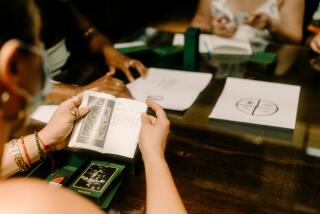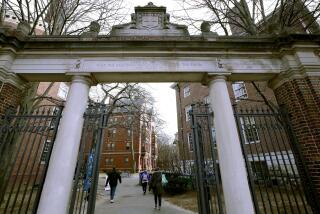Robert N. Bellah dies at 86; UC Berkeley sociologist
- Share via
Robert N. Bellah, a UC Berkeley sociologist who turned the analysis of religion’s role in American society into a bestselling book and a thriving academic pursuit, died Tuesday at an Oakland hospital. He was 86.
The cause was complications after heart surgery, said his daughter, Jennifer Bellah Maguire.
Bellah made his mark with a provocative 1967 essay titled “Civil Religion in America,” which argued that a central feature of the American political tradition was the belief in God as a higher authority over the nation.
The essay, with its examination of presidential speeches going back to the founding fathers, propelled the study of religion from the backwater of his discipline to the forefront, spurring a flood of popular and scholarly writing, conferences and college courses.
“No one was talking about religion when he wrote that essay,” said Alan Wolfe, a political scientist who directs the Boisi Center for Religion and American Public Life at Boston College. “He made religion relevant even to people who don’t put it at the center or who know nothing about religion. It was really path-breaking in that sense.”
Bellah went on to co-write the bestselling “Habits of the Heart” (1985), a study based on interviews with an array of middle-class Americans that illuminated the dangers of a “radical individualism” rampant in American culture in the 1980s.
“We are concerned,” Bellah and his four co-authors wrote, “that this individualism may have grown cancerous … that it may be threatening the survival of freedom itself.”
Many critics regard “Habits of the Heart” as his most enduring work. By the end of its first decade in print, it had sold close to 500,000 copies, placing it, as one critic noted, among “that rare breed of sociological works … with sales figures beyond the total number of practicing sociologists in the world, past and present.”
Among the book’s claims to fame is an expression that lit the imagination of a generation of religion scholars: “Sheilaism.”
The term was derived from the pseudonymous Sheila, the name Bellah and his collaborators gave to a non-churchgoing believer in God who had invented a belief system so private and personal that she described it as “Sheilaism. Just my own little voice.” Sheila became a symbol of the individualism that many spiritual leaders cited as a major reason behind the decline of organized religion.
Bellah wrote or collaborated on more than a dozen books, including “The Broken Covenant: American Civil Religion in Time of Trial” (1975) and “The Good Society” (1991), a wide-ranging critique of contemporary American institutions written with his “Habits of the Heart” co-authors, Richard Madsen, William M. Sullivan, Ann Swidler and Steven M. Tipton.
His last book, “Religion in Human Evolution” (2011), was an audacious synthesis of science and history that fulfilled Bellah’s long-held desire to understand the origins of religion. Hans Joas, the eminent German social theorist, called it “the opus magnum of the greatest living sociologist of religion.”
Robert Neelly Bellah was born in Altus, Okla., on Feb. 23, 1927. His father, a newspaper editor and publisher, died when he was 2, leading his mother, Lillian, to move the family to Los Angeles, where she had relatives.
Bellah attended Los Angeles High School, where he and his future wife, Melanie Hyman, were editors of the student newspaper. They were married in 1948 after she graduated from Stanford University, and he began studying at Harvard University after a stint in the Army.
At Harvard, Bellah was driven to study tribal cultures and later East Asian civilization because of a self-professed “ambivalence about America.”
“It seems I could make sense of the apparently chaotic society in which I lived only by taking triangulations from distant positions,” he wrote in “The Robert Bellah Reader” (2006).
He earned a bachelor’s degree in social anthropology in 1950 and a doctorate, also from Harvard, in sociology and Far Eastern languages in 1955. His dissertation, “Tokugawa Religion,” published in 1957 and still in print, established him as an authority on Japanese history and culture.
He was fluent in Japanese and literate in Chinese, French and German. He later studied Arabic at McGill University in Montreal, where he wound up after a painful experience at Harvard.
As an undergraduate, he joined the Communist Party and was a member from 1947 to 1949. He was a graduate student completing his doctorate in 1954 when McGeorge Bundy, then Harvard’s dean of faculty, pressured him to confess his activities and name his former Communist associates. Bellah refused and headed to McGill when his Harvard fellowship was canceled.
“Harvard did some terribly wrong things during the McCarthy period,” he wrote in a letter published by the New York Review of Books in 1977.
He returned to Harvard as a lecturer in 1957, as McCarthyism was waning, and later became a full professor of sociology.
Toward the end of his decade on the Harvard faculty, his chief mentor, sociologist Talcott Parsons, encouraged him to write a paper for a conference on American religion in 1966. The paper, “Civil Religion in America,” was published the next year in the journal Daedalus and became Bellah’s most frequently reprinted article.
It drew critics, including many secularists, and was a factor in the intense opposition to his nomination as a permanent member of the Institute for Advanced Study at Princeton University in 1973, said his biographer, Matteo Bortolini. Bellah, who had joined UC Berkeley in 1967, ultimately turned down the appointment and remained at Berkeley until his retirement in 1997.
His writings on civil religion not only made him one of the country’s foremost public intellectuals but also changed his life in a more personal way. It led him back to the institutional church after having rejected organized religion for much of his adult life.
Raised as a Presbyterian, he joined an Episcopalian congregation in Berkeley, he wrote in the Christian Century magazine in 1991, after “25 years of shopping for the right parish.”
Bellah’s wife died in 2010. In addition to his daughter Jennifer, of Los Angeles, he is survived by daughter Hally Bellah-Guther of Berkeley; a sister, Hallie Reynolds of San Diego; and five grandchildren.
Just days before his heart surgery, he wrote passionately to colleagues about how the ending of a philosophical tome by German theorist Peter Sloterdjik had “swept me completely away and it took me nearly an hour to recover.”
At 86, Bellah “was still excited as a freshman discovering philosophy for the first time,” Bortolini said Friday. “I think that the best way to remember a great scholar like Bellah is … how he kept a youthfulness and a joy in reading, studying, writing and discussing powerful ideas with his friends and collaborators until the very end.”
More to Read
Start your day right
Sign up for Essential California for the L.A. Times biggest news, features and recommendations in your inbox six days a week.
You may occasionally receive promotional content from the Los Angeles Times.







